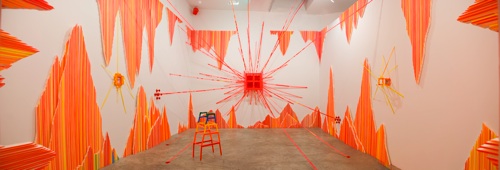
Diana Cooper, "Orange Alert UK" , 2003 - 2007

Cai Guo-Qiang, Inopportune: Stage one, 2008

Merce Cunningham & The OpenEnded Group, Loops, 2008
Wood
Until March 1, 2008
Paula Cooper Gallery
Carl Andre, Donald Judd, Sherrie Levine, Sol LeWitt and Jackie Winsor: here's a lot of Minimalist sculptures, done in wood, of Judd's "one thing after the other"..
Outside In: New Realms for Taiwan Art
Until March 12, 2008
Taipei Cultural Center, 1 E. 42nd st
The artists in this exhibition seem to work in new media/installation art; might be interesting.
Power
Until March 29, 2008
Foxy Production
Foxy Production presents Power, a group exhibition where light is the common focus: electric light, black light, reflecting light, the sound of light, light sources. Drawing together a disparate group of artists, the exhibition holds a range of conceptual experimentations, ideas and practices under the spotlight.
Diana Cooper - Overdrive
Until March 29, 2008
Postmasters Gallery
I am fascinated by maps, subway systems, color-coding, the relationships between macroscopic and microscopic imagery. But I always feel that I operate by osmosis. I really am influenced by the visual world. I want the work to have a sensuality and visual impact. And I think a lot of systems are visual. Systems are a way people try to make sense of things or create order. They also are all around us, in the natural world and in the man-made world, and I am intrigued by how they intersect, echo one another, or come into conflict. But I am less drawn to the specific content or narrative of a given system, which for me is just raw material. In fact, I am interested when something like a diagram or a graph disassociates itself from its origin and becomes something else entirely.
Brainwave: Common Senses
Until April 19, 2008
Exit Art
BRAINWAVE: Common Senses responds to current advancements in neurological research by visualizing and investigating the brain's capacity for sense perception, memory, emotion and logic. The artists in this exhibition redefine this research in a different way, abandoning literal representations of the brain and categorical analysis in favor of works that take, as starting points, elements from neuroscience and flipping these ideas on their heads.
Design and the Elastic Mind
Until May 12, 2008
MoMA
The exhibition will highlight examples of successful translation of disruptive innovation, examples based on ongoing research, as well as reflections on the future responsibilities of design. Of particular interest will be the exploration of the relationship between design and science and the approach to scale.
Cai Guo-Qiang: I Want to Believe
Until May 28, 2008
Guggenheim
The structure of Cai's art forms are inherently unstable, but his social idealism characterizes all change, however violent, as carrying the seeds of positive creation.
Ever since I saw one of his giant explosion-paintings at MoMA, and watched/read about his Transient Rainbow, I've been waiting for this retrospective/exhibit. Looks exciting..
Loops
Feb 26, unveiling of choreography and code
This digital version of Loops was commissioned by the MIT Media Lab in 2001 and derives from a definitive recording of [Merce] Cunningham performing the work in a motion capture studio. This recording preserved the intricate performance as 3D data, which portrayed not Cunningham's appearance, but rather his motion. Cunningham's joints become nodes in a network that sets them into fluctuating relationships with one another, at times suggesting the hands underlying them, but more often depicting complex cat's-cradle variations. These nodes render themselves in a series of related styles, rendered to resemble gesture drawings.
This is a digitization/opensource documentation of Merce Cunningham's loops, data captured using motion capture systems, released under an open source license. Not quite an exhibit, but something to work on.
Tangential to this is the White Glove Tracking project, which utilized the collaborative power of internet users to track the location of Michael Jackson's white glove in a video of his performance of Billy Jean, and released the source video and coordinates for further use.
One of the first ideas I immediately thought of (after seeing Paul Pfeiffer's piece at MoMA's Automatic Update exhibition at the time) was to move and resize the video so that the white glove would remain the same size, in the center of the frame. Of course, somebody (a Zach Lieberman) also had the same idea and had done it already.
update:
Honey Space
Westside Highway, between 21st and 22nd streets.
Article here.



